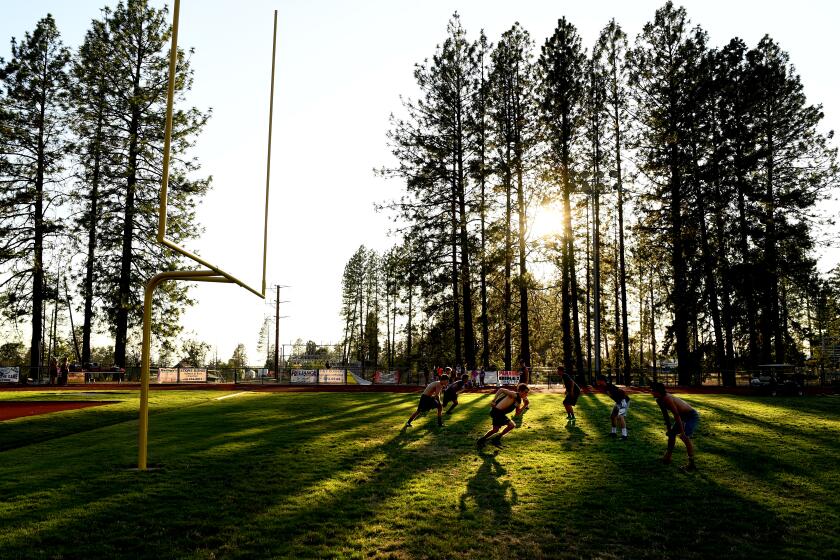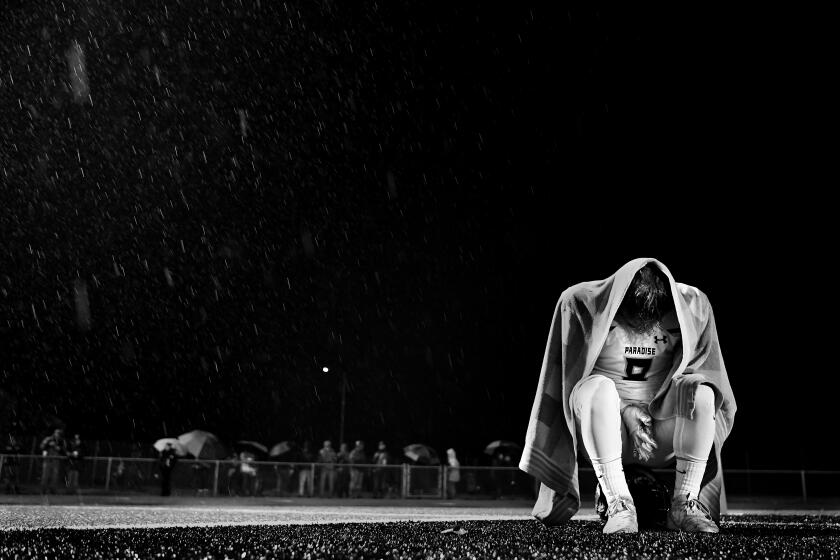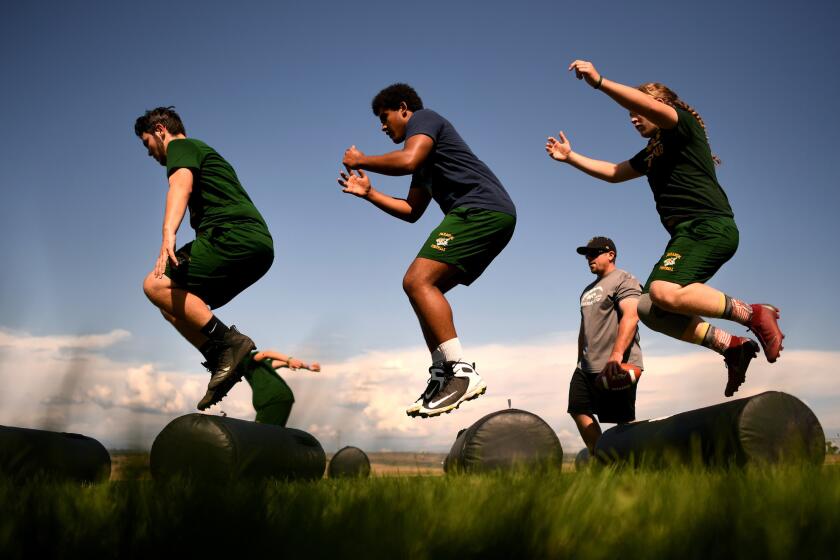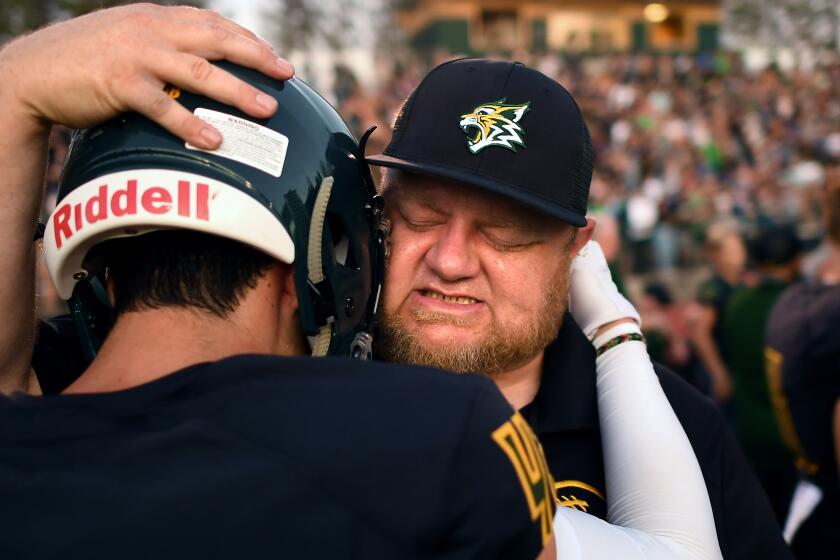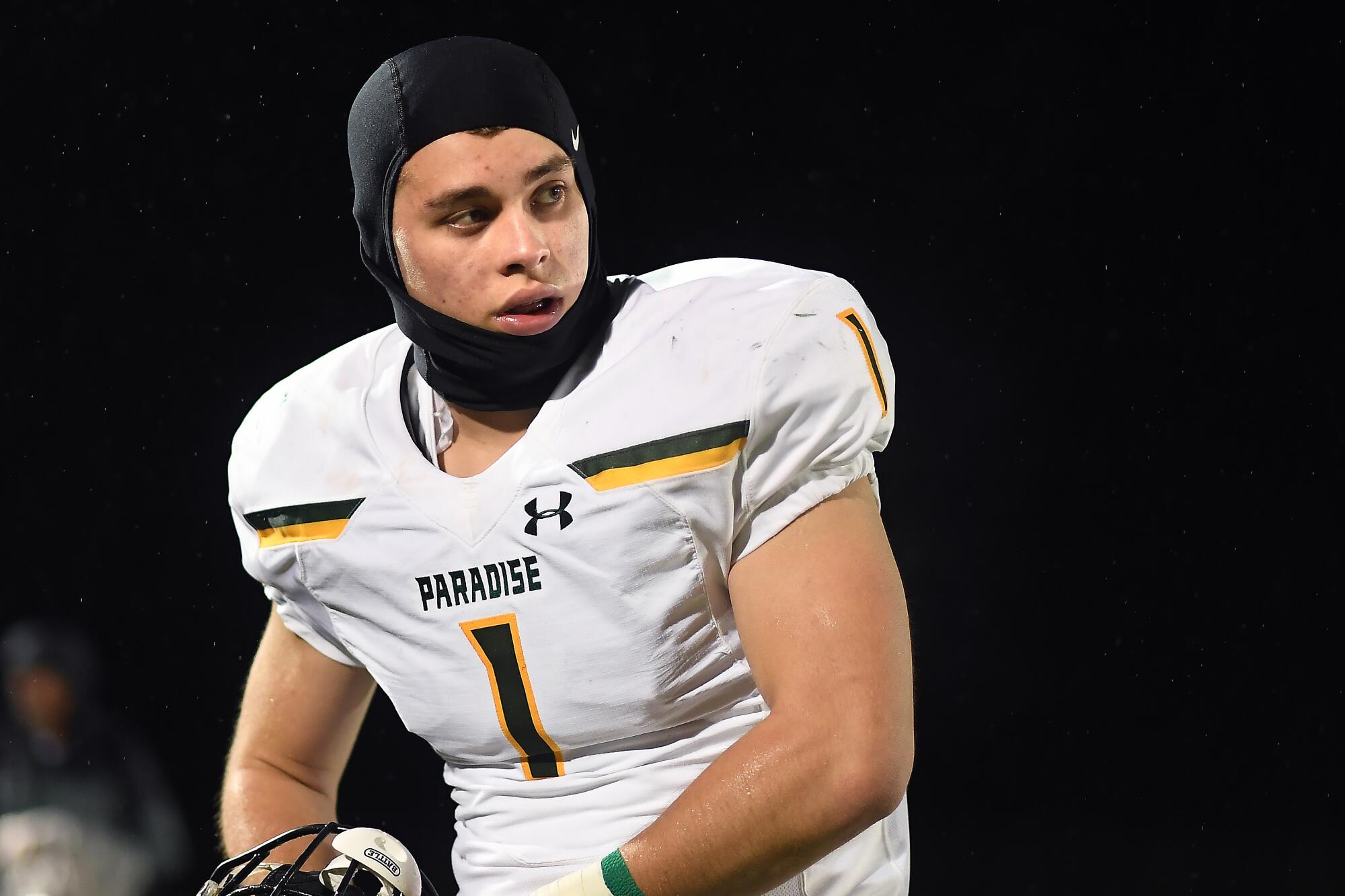
- Share via
“Rising from the ashes” is a common metaphor in the athlete comeback genre, but it is literally the story of the Paradise Bobcats, most of whom lost almost everything in a 2018 wildfire that reduced 18,000 homes to smoldering ember. The following is an excerpt from Bill Plaschke’s new book, “Paradise Found: A High School Football Team’s Rise From the Ashes” and tells the story of one player’s flight to safety.
What is dark within me, illumine.
-John Milton, “Paradise Lost”
The kid was stranded at the top of a raging mountain. He was going to be burned alive and alone. He was going to die without his family, without his friends, with only his panting dog Gracie by his side. He was going to die in a scorching parking lot surrounded by a roaring fire and screaming strangers.
Spencer Kiefer, just months after his sixteenth birthday, grabbed his impossibly hot phone, prayed it could hold a signal, and called his father, Greg, who was trapped in his own car while pulling the family trailer several blocks away trying to get his son. The teen began speaking and couldn’t stop sobbing.
“Dad, I’m gonna die,” he said.
After losing everything in the deadly Camp Fire last year, the Paradise High football team leans on camaraderie and community to rebuild their lives.
Spencer was a middle linebacker for the Paradise Bobcats. He could dish it out. Earlier in the season, he had separated his shoulder simply from hitting the guy carrying the ball. He could play with pain. But he couldn’t play with this. The smoke filled his lungs as he uttered what he thought might be his last words.
“Dad, I don’t want to die, but I’m gonna die,” he said. “Good-bye.”
“Wait! Wait! You’re not gonna—!” screamed his crying father into a phone that suddenly went dead.
Spencer’s mother had felt it coming. Earlier on the morning of November 8, 2018 she knew something was terribly wrong. Shelly Kiefer, a first-grade teacher at Paradise Elementary, kept waking up during the night. It was the stained glass butterfly wind chimes, four sets, hanging on the back porch. They kept rattling, a noisy rattling, which meant the wind was really blowing. She finally fell asleep, woke up late, jumped in the car for the quick drive to school, and saw a huge plume of smoke. She stopped. She turned around. She drove back home to warn husband Greg and her two children.
“Something’s happening,” she said. “If you get evacuated, go down to Grandpa’s in Durham.” The small town of Durham was about twenty minutes away, just south of Chico.
Shelly hurried back to her car and then off to the school. The kids would be there. If this smoke turned into anything serious, they would need her. As she drove, the smoke grew thicker but, strangely, she didn’t see any fire. Nor did she hear any sirens. She pulled into Paradise Elementary at the same time one parent who was married to a policeman dropped off her child. There was nothing to worry about, the woman said assuredly. Suzanne sighed. But then five minutes later, the mother came back to pick up her child and was shouting for other parents to take their kids and get out.
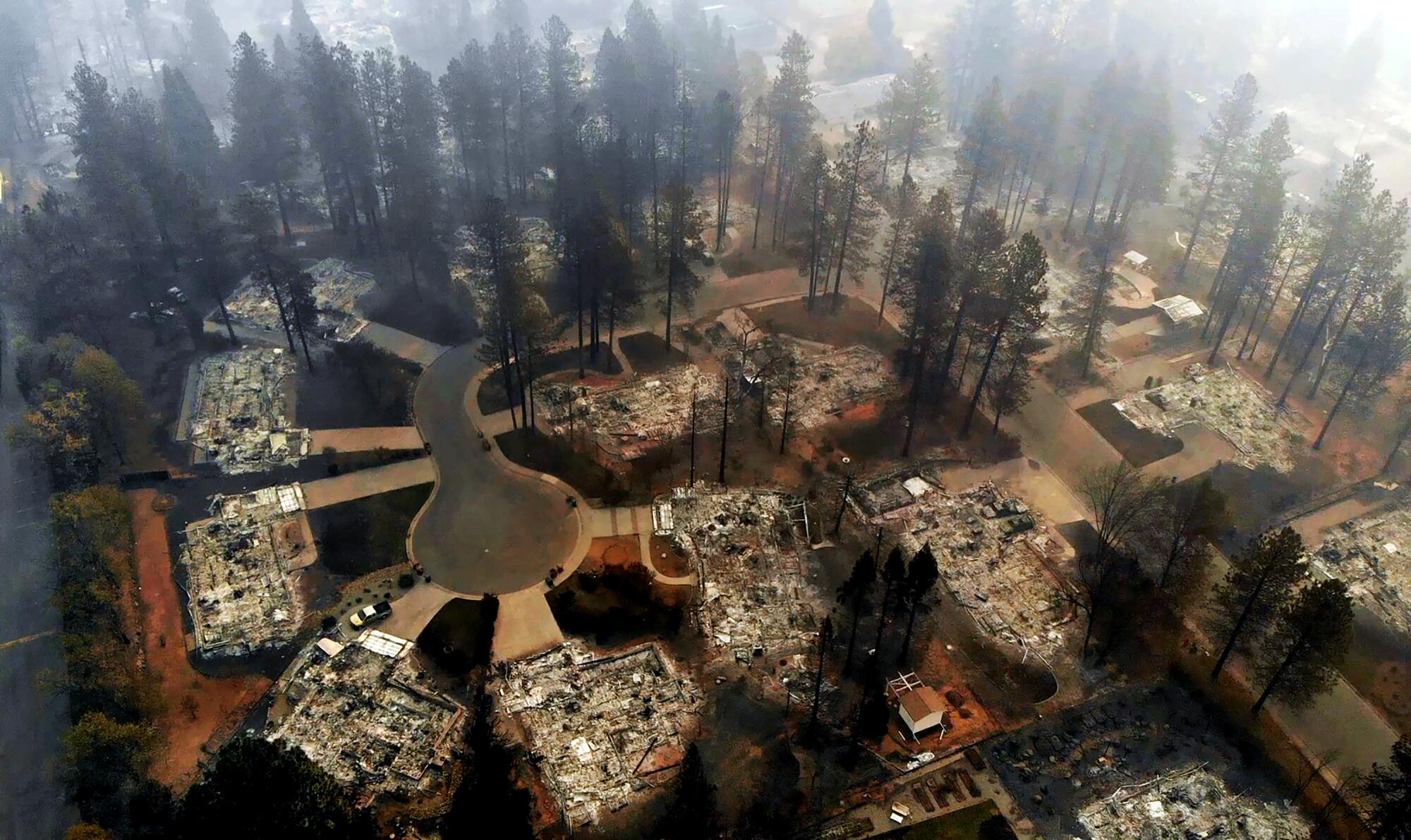
Shelly couldn’t leave. She had to stay with her pupils until they were all picked up. The school’s halls filled with smoke. Parents were having trouble making their way to the school. Outside, Skyway Road was already gridlocked. People were driving on sidewalks or abandoning their cars. When the last child departed the building, she ran to her car and phoned her husband. Greg was preparing to evacuate. He was alone. Their daughter, Sarah, had left home earlier to head down the hill with her grandmother.
“Don’t even try to get back to the house; you’ll never make it,” Greg told her. “Just go down the hill yourself.”
“Where’s Spencer?” Shelly asked.
“He’s already gone to school,” Greg said.
“By himself?”
Spencer had calmly shrugged at the warnings and left the house like it was any other day. He was going to be fine. He could drive through anything. He was still a kid, but he was becoming a man. He had just earned his driver’s license. His father had given him an aging Ford F-150 pickup truck as a present. He had not driven it many places. Growing up on a quiet street in Paradise, there weren’t many places to go. But he still knew how to drive, and he knew the directions to the high school, and what else mattered?
Spencer liked driving to school. He liked rolling that big truck into the parking lot and pulling up next to his teammates and hanging out before class. After school, he would return to the Ford, put on his uniform next to the truck bed, then hang out there until it was time to run down to Om Wraith Field and knock the snot out of someone. The truck was cool. The truck was safety.
So Spencer wasn’t that worried until, while sitting with friends on his truck in the parking lot on the morning of November 8, dark blotches began falling from the sky. They looked like coal-colored leaves. They smelled like burning trash. They were giant pieces of ash. Something big was on fire. Then principal Lauren Lighthall came out to tell everyone to go home.
“Oh, s—-,” Spencer said.
He immediately jumped in the truck and raced home to his father. Greg was recovering from back surgery and would need some help. Spencer drove against traffic, trying to ignore the gridlock headed in the other direction, and finally pulled into their ash-filled driveway. He ran inside and grabbed a trash bag, filled it with photos and medicine, threw it in the truck, then helped his father hook up a trailer to Greg’s truck. All around them was smoke. He could see flames in the distance. This was going to be bad.
They had lived in their home seventeen years. Three bedrooms, two and a half baths, on a half acre, with a wraparound porch. It was their pride. It was their life.
They’d found it in a newspaper ad. Greg walked up and knocked on the door in a pouring rainstorm. The nice woman who answered invited them inside. They saw the hardwood floors and were sold. They called the Realtor and bought it on the spot at full price. They signed the bank papers that night. The time stamp was ten thirty. Even the address was lovely: 1678 Aspen Lane.

Regrouping after the devastating 2018 Camp fire, the Paradise High School Bobcats football team became a powerful symbol of a community coming together after unthinkable adversity.
The Kiefers painted all the rooms, refurbished everything, new hot water heater, new air-conditioning, and the dream house slowly became a dream home. They raised two children there. The kids had ridden Big Wheels on the hardwood floors and finger-painted on the walls. The family room had a fireplace with a gas stove, which everyone would gather around for holidays, when they weren’t chasing down Easter eggs in the front yard. There were no such hunts in the backyard, because, like many similar homes in Paradise, the yard belonged to the chickens and goats.
Greg loved that house. As the smoke kept getting closer, he made the decision to send Spencer down the mountain with the family dog while he stayed put, watching for looters and maybe even helping the firefighters.
“I’ll be fine, Dad,” said Spencer. “I’ll just drive down the hill.”
Paradise High’s football team propped up an entire community in the wake of the devastating Camp fire. But the Bobcats couldn’t ride their emotions to a championship.
He soon realized it wasn’t going to be that easy. He took his usual shortcut to Skyway, but suddenly he found himself stuck on a narrow road filled with cars, with flames seemingly threatening from all sides. A policeman approached him with an order.
“Leave your vehicle, walk to the Optimo parking lot. Do it now!” the cop said, referring to a local Chinese restaurant landmark. “It’s your only chance.”
Suddenly it all became real. The truck couldn’t save him. His cool new driver’s license couldn’t save him. The familiar hill out of town couldn’t save him. He phoned his father, who had started navigating a different path down the mountain. For the first time, Spencer began crying.
“I’ve lost the truck!” he said. “Dad, I lost the truck!”
Let the truck go. If you have to, let the dog go, too! Save yourself, Son. Save yourself.
As the son was making a life-or-death decision, so was the father. Earlier, when Greg was stomping on fires in front of his house, a fire chief had pulled up and ordered him to go. But the moment Greg heard Spencer was stuck, he turned the trailer around and headed into the traffic to find his son. He couldn’t go. He wouldn’t go. He would not leave the mountain until Spencer left the mountain.
Greg drove through streets that looked like they were lined with torches and pulled up to a spot where the fire was behind him and his son was somewhere in front of him. Either he was going to get his son or perish in the flames. Greg was a former US Army platoon sergeant who’d fought in the 1991 offensive against Iraq, Operation Desert Storm. He had been on the front lines. He had been bombed. But with the wind blowing flames at his back and his son’s life dangling just a half mile ahead, he had never been in a position quite like this one. All he could do was wait, and pray, and try like hell to breathe.
“I’m going to be burned alive,” Greg thought to himself before shouting into the phone, “I’m not leaving you, Son!”
“I’m really scared, Dad!” Spencer shouted back.
“I’m coming to get you!” But Greg couldn’t go anywhere.

After losing everything in the deadly Camp Fire last year, the Paradise High football team leans on camaraderie and community to rebuild their lives.
With his father still stuck about a half mile away, Spencer was able to maneuver his truck to the side of the road, then walked with Gracie, his beloved Labrador, for a mile and a half to a holding cell of horrors. There was fire in front of him and fire behind him. As the sky blackened and the smoke rolled, he arrived at the Optimo parking lot to join dozens of people who were crying or gasping or praying. They couldn’t move forward. They couldn’t turn around. They were the definition of trapped. It was here that Spencer made the call to his father, predicting his death and bidding farewell. His father’s offer of encouragement was silenced by the dying phone. Down the mountain, where Suzanne had already driven, she couldn’t get ahold of either her husband or her son, and she spoke the awful truth into the smoke.
“If I lose Spencer, I’m gonna lose Greg,” she said. “If one doesn’t make it out, the other one won’t make it out. Dear God, please save them.”
For several hours, Spencer stood in that parking lot. Not once was he certain he was going to survive. Not even when firefighters busted out storefront windows so that the stranded could get inside away from the smoke. Not even when helicopters dropped water on the fire around them. The roar of the hot wind and the thickness of the smoke were accentuated by the bang-bang-bang! of explosions. He was standing in front of a propane store, and the tanks were exploding around him. He had begun the day with five bottles of water, but, after sharing them with Gracie, he was nearly out. By now, he was also seriously worried about his asthma. He stripped off his sweatpants and placed them over his mouth.
“Breathe, damn it,” he whispered to himself as he sucked air through the cotton. “Breathe!”
The Camp fire destroyed their town. Now the Paradise High football team is trying to save themselves
The hills that stretch above this grassy pasture were once ablaze, an apocalyptic fire consuming their homes, disrupting their families, melting their childhoods.
Nearly out of hydration and hope, Spencer walked out of the shattered storefront and clung to a group of policemen, figuring they would be the last ones to perish. Turned out that they were the first ones to offer a sliver of hope. Late in the afternoon, an officer announced that bulldozers had cleared the burning and abandoned cars off Skyway. At the time, another policeman who knew the family had taken Spencer’s keys and found his astoundingly unscarred truck and drove it up to him.
“Get in,” the cops said. “You’re driving in a caravan down the hill.”
“Hell yes I am!” exclaimed Spencer.
So the sixteen-year-old with three months’ driving experience calmly steered his truck fifteen miles downhill through flames. He thought how this was no different from a summer tackling drill in hundred-degree heat with coach Paul Orlando exhorting him to keep pounding. This was no tougher than one of Rick Prinz’s three-hour August workouts that end in gasping and sweat. If he could survive Paradise football, he thought, he could do this.
Times columnist Bill Plaschke writes about Paradise High School football team’s first season since a devastating fire destroyed their town in November 2018 and claimed the lives of 86 people.
Spencer remembered his mother’s directive and eventually steered off the Skyway and headed south toward Durham, all the time charging his phone. At 5:53 p.m., nearly ten hours after his nightmare began, he pulled into a parking lot in Durham and slumped over the wheel. There were burn holes in his clothes. His sweatpants had turned black. His dad was still on the hill, and he couldn’t reach him. He knew he needed to call his mom, but he knew he would cry, and first he wanted to celebrate. So he called a buddy, Trevor Rickson.
“I’m alive, b——!” he screamed.
When Greg found out his son was safe, he could finally leave the mountain. Tugging a twenty-eight-foot trailer, he navigated a one-lane back road down around the fire, and went straight to a Costco parking lot, where, at about nine at night, father and son collapsed together in tears. Their nightmare, however, was just beginning.
That night, while Spencer slept on the floor of a family friend’s house, Greg dozed in the front seat of his truck. He was exhausted and in shock.
“What happened to our life?” he kept saying over and over.
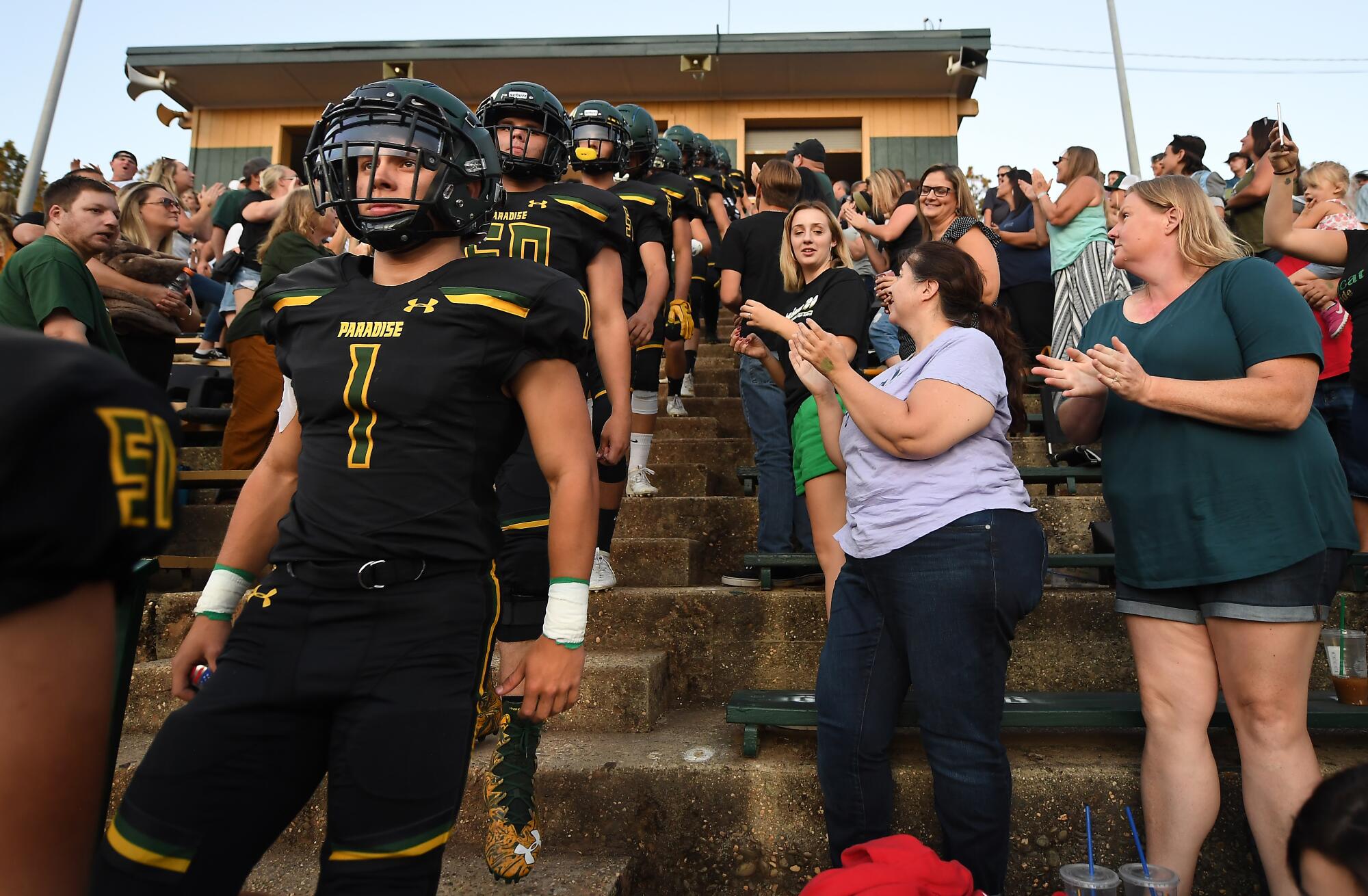
Two days later, Greg was still in the front seat of the truck when someone from the neighborhood approached and tapped on the door with a question:
“Are you okay?”
Greg just rolled up the window and turned away.
A buddy from the Paradise Sheriff’s Department stopped by later with a video showing that the Kiefers’ dream house had burned down to the stubs.
“Nothing is ever going to be the same,” Greg said.
This included Spencer.
This article has been adapted from”Paradise Found: A High School Football Team’s Rise From the Ashes,” by Bill Plaschke. Copyright © 2021. Available from William Morrow, an imprint of HarperCollins Publishers. You can purchase the book here.
Ask A Reporter
What: Columnist Bill Plaschke will discuss his career as a sports writer and the stories behind “Paradise Found” with Times Executive Sports Editor Christian Stone.
When: Nov. 17, 6 p.m. PT.
Where: This free virtual event will be live streaming on Twitter, Facebook and YouTube. Sign up on Eventbrite.
More to Read
Go beyond the scoreboard
Get the latest on L.A.'s teams in the daily Sports Report newsletter.
You may occasionally receive promotional content from the Los Angeles Times.

